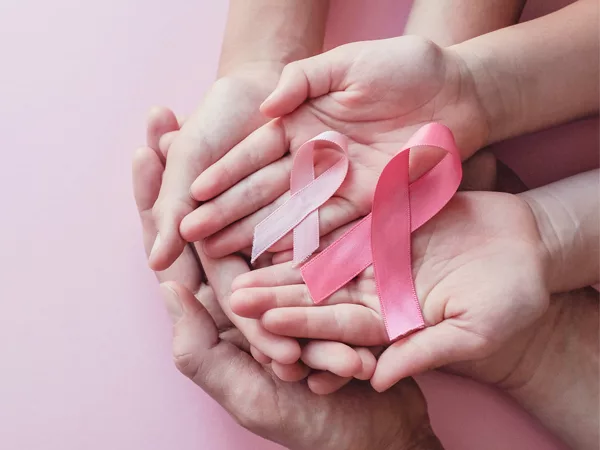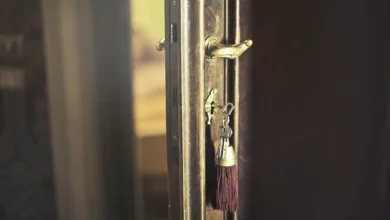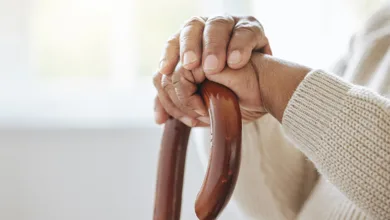Knowledge Is Power in the Fight Against Hereditary Cancer

My grandmother died of breast cancer at 41. My great-grandmother, at 45. So, I always knew my risk of breast cancer was high. But until I tested positive for an inherited a BRCA2 genetic mutation, I had no idea it could be as high as 69 percent.
Most cancers are not hereditary. However, 5-10 percent of cancers develop due to inherited genetic variances. BRCA2 mutations also elevate the risk of other cancers, including ovarian cancer, pancreatic cancer, and melanoma. (BRCA1 mutations carry a higher risk of breast and ovarian cancers, as well.)
When I tested positive for a BRCA2 mutation in 2009, I was 41 and my son was still in diapers. Suddenly, I worried I might not live to see him grow up. I remember sitting in my doctor’s office, frightened, as he suggested I consider reducing my risk by having both a double mastectomy and an oophorectomy (a surgery to remove my ovaries). He emphasized it’s easier to prevent cancer than to treat the disease.
The good news about discovering you carry a harmful genetic variance is you have the opportunity to be proactive. Based on my doctor’s advice, I had surgery to remove my ovaries in 2009, the same year I learned about my BRCA2 mutation. Ovarian cancer, which also runs in my family, can be difficult to detect until it is advanced. There is no reliable screening for ovarian cancer. I didn’t want to take my chances.
As far as a double mastectomy, I couldn’t wrap my mind around having my breast tissue removed to prevent a disease I didn’t have and may never get. Initially, I opted for closer screenings that included MRIs in addition to mammograms to try to detect breast cancer early. But my risk weighed on me. I was haunted by the words of a woman whose cancer had spread and who later died from the disease: “You don’t want to catch cancer early — you don’t want to catch it at all.”
In 2015, my mom was diagnosed with early-stage breast cancer. (She recovered and is doing well.) Her diagnosis showed me no generation of our family had escaped cancers tied to BRCA mutations. I had a preventative double mastectomy in 2016, one of the most difficult decisions of my life. I knew I had made the right choice when the pathology revealed that I had the earliest form of breast cancer, ductal carcinoma in situ (DCIS). I was lucky: I didn’t need any further treatment.
Now that I have taken steps to reduce my risk of BRCA-related cancer, I work to raise awareness about genetic testing. I serve as a volunteer state impact leader for a Facing Our Risk of Cancer Empowered (FORCE), an organization providing information, advocacy, and support to people facing hereditary cancer. I help coordinate and lead monthly meetings providing information and support to people facing hereditary risk of cancer.
Since I tested positive for a BRCA2 mutation, many more mutations linked to hereditary cancers have been discovered. Genetic counselors now test for a panel of mutations linked to breast, colorectal, endometrial, fallopian tube, ovarian and primary peritoneal, gastric, melanoma, pancreatic, and prostate cancers.
I hope those of us who inherited high cancer risks can make informed decisions to reduce our risk of cancer as much as possible. I truly believe genetic testing saved my life.
Learn more at https://www.facingourrisk.org/.
Should You Consider Genetic Testing?
A genetic counselor can help determine whether you should consider testing for inherited genetic variations that carry an increased cancer risk. Signs that a person’s personal or family medical history may suggest a hereditary cancer syndrome include:
- Cancer diagnosed at an unusually young age
- Several different types of cancer in the same person
- Cancer in both organs in a set of paired organs, such as both kidneys or both breasts
- Several first-degree relatives (the parents, siblings, or children of an individual) with the same type of cancer (for example, a mother, daughter, and sisters with breast cancer); family members with breast or ovarian cancer; family members with colon cancer and endometrial cancer
- Unusual cases of a specific cancer type (for example, breast cancer in a man)
- The presence of birth defects that are known to be associated with inherited cancer syndromes, such as certain noncancerous (benign) skin growths and skeletal abnormalities associated with neurofibromatosis type 1.
- Being a member of a racial or ethnic group that is known to have an increased risk of having a certain inherited cancer susceptibility syndrome and having one or more of the above features as well
- Several family members with cancer
SOURCE: National Cancer Institute (https://www.cancer.gov/about-cancer/causes-prevention/genetics/genetic-testing-fact-sheet)






